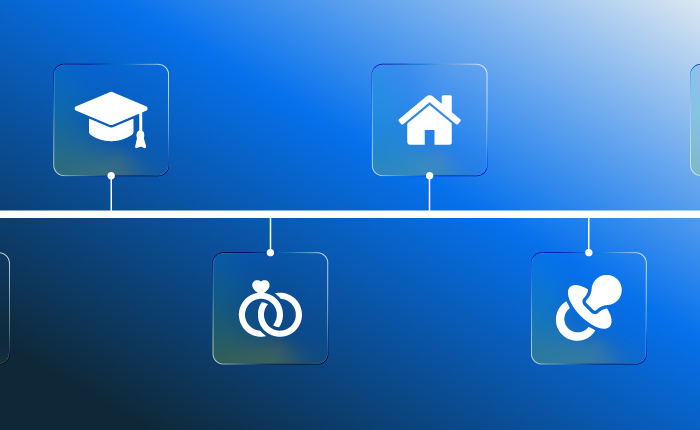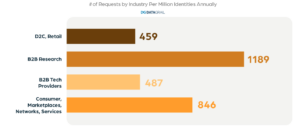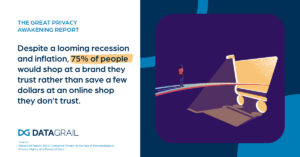What did we do before specialized businesses and apps emerged to help guide us through life’s critical junctures? The number of apps available to help us prepare for all of life’s moments is nearly endless, from planning for college savings to weddings, pregnancies, and beyond.
However, enjoying these apps often comes with the tradeoff of sharing our personal data, and consumers taking notice. Our Privacy Trends 2023 report found that “Companies offering a service or product for a specific point in time or part of life (like getting married, having a baby, researching colleges, etc.) tend to receive more [data subject] requests than average. Companies offering a lifelong service typically see fewer requests.”
As soon as a specific life event is over, consumers will likely delete the related apps to avoid giving away more sensitive data than necessary. Certainly, some dropoff is expected — having a baby removes the need for pregnancy tracking. You simply move past that point in life and on to the next.
In response, companies increasingly offer apps and experiences for multiple journeys and stages throughout consumers’ lives. Think: Wedding planning apps that provide “next steps” like sending thank you notes and financial tips for newlyweds. In light of these new offerings, it’s time for organizations to take notice of increasing data privacy concerns so they can continue delivering exceptional experiences while adhering to shifting regulations and consumer preferences.
If you work for a business offering services related to particular life events, you know the challenges that come with identifying and reaching prospective customers. Here’s what you should be thinking about and doing to maximize your marketing efforts while honoring your customers’ data privacy rights and concerns.
How Concerned Are Different Age Groups About Data?
Conventional wisdom suggests that certain age demographics are uninformed about or indifferent toward data privacy, but some research proves otherwise. Studies show that college students and the elderly are increasingly concerned about data privacy and are asking hard questions about how and why companies are collecting and using their data.
Given that our findings show that 75% of people in 2022 were aware that companies sell data to third parties (up from 62% two years prior), it makes sense that people of all ages are joining the chorus of concerns.
Further, certain industries and types of services that rely on sensitive data, like fertility apps and pregnancy products, carry increased data privacy risks. Government officials and agencies are taking notice of these risks, as evidenced by the FTC’s recent findings and resulting order concerning a fertility app developer’s multiple data privacy violations. As regulatory action and media attention drive consumer awareness, we can expect users to begin exercising more caution while navigating these digital services and vendors, if they haven’t started already.
It’s time for companies to take note of and attend to these developments to shed light on potential data privacy pitfalls within organizational structures and practices.
Rising Consumer Concerns Drive Data Privacy Legislation
Following the European Union’s lead with the General Data Protection Regulation (GDPR), many legislative bodies in the U.S. are introducing and enacting state-level data privacy laws of their own. Consider the California Consumer Privacy Act (CCPA) as amended by the California Privacy Rights Act (CPRA), one of the most significant developments in U.S. data privacy. Many of these laws establish a consumer’s right to:
- Know what personal/sensitive information companies collect
- Access, correct, and delete personal information collected by companies
- Opt out of the selling or sharing of collected personal information
- Exercise privacy rights without experiencing discrimination
- Receive notice of any data breach that may compromise their personal data
These expanded rights are likely to result in a higher volume of privacy requests or data subject requests (DSRs) for organizations requiring sensitive data to target consumers entering specific life stages.
Responding to DSRs in a timely manner and taking proactive steps to protect sensitive data are surefire ways to meet consumer expectations, eliminate their concerns, and bolster the reputation of your company as a steward of privacy and security.
Beyond cyberattacks and data breaches, regulators are paying closer attention to third-party data sharing and selling. Recent regulatory news like Sephora’s settlement in California and the FTC’s actions toward GoodRx make it clear that governing bodies are prioritizing enforcement.
Personalizing Experiences While Respecting Privacy
Navigating the shifting landscape of data privacy regulations and consumer concerns while reaching your target demographic may seem challenging, but it’s not impossible. Taking these steps can help your company establish data privacy as a core value:
Make Opt-Outs Easy
Do you ever visit a website with a cookie banner offering 10 different opt-out options forcing you to click 10 different checkmarks? You probably don’t love it, and neither do your customers.
To streamline the experience, prioritize convenience for consumers to opt out of data collection. Employ clear, concise language and minimize the number of times users need to click.
Map Your Data
Data mapping helps companies discover and manage unknown sources of personal data and provides the foundation for building a comprehensive data privacy program. Uncovering risk from shadow SaaS and painting a complete picture of your tech stack with a dynamic Live Data Map provides complete program visibility, enables efficient privacy request fulfillment processes, and lowers the likelihood of dissatisfied customers.
Implement Privacy by Design
The concept of Privacy by Design focuses on building privacy into the core of a product, service, or organization from the start. Implementing Privacy by Design principles across your organization emphasizes the privacy’s value and the importance of designing products with privacy at the core.
Simplify the DSR/DSAR Process
People are increasingly aware of their privacy rights and are more frequently taking steps to access, delete, or correct their data. Demonstrate your commitment to transparency by making the privacy request process easy and seamless for your consumers. Make the option to submit DSRs/DSARs visible and accessible, and avoid burying privacy request forms deep in your privacy policy or behind dozens of clicks.
Satisfy Consumer Data Privacy Demands With DataGrail
Technology increasingly helps people around the world navigate important life events, but it’s vital to ensure consumer privacy rights are acknowledged and fulfilled.
Working to understand the shifting landscape of data privacy trends is a great starting point for learning how to meet consumer demands. Start with our Privacy Trends 2023 report.
When implementing your privacy practices, take a moment to remind yourself that at the end of the day, your customers are people just like you. Reflect and ask, “Is this the experience I’d like to have?”
If you’re sincerely confident the experience is satisfactory, then you’re probably on the right track.


